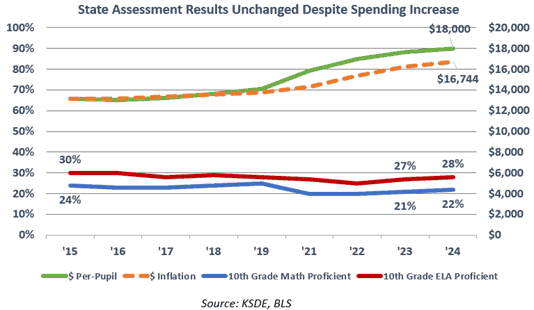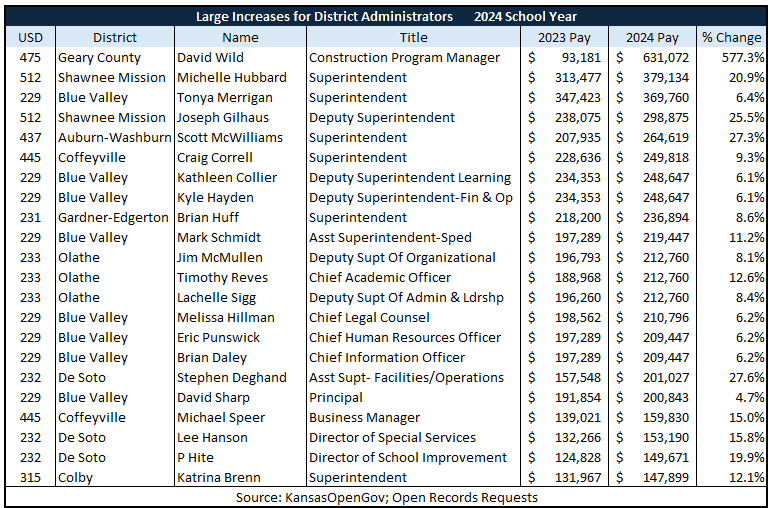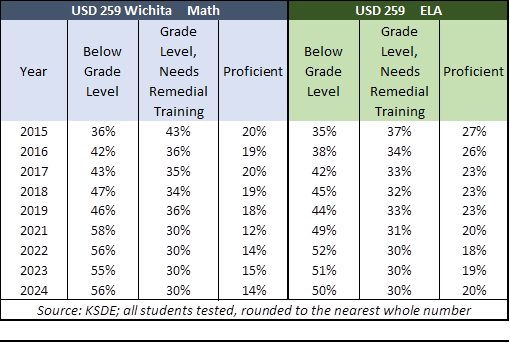The 2024 school year was déjà vu all over again – nice pay increases for administrators and low proficiency levels.
Reading and math proficiency for 10th-grade students improved very slightly from 2023 to 2024, but both remain below 2015 levels. Math proficiency was 24% in 2015 and now is at 22%; ElA was 30% and is now 28%. The percentage of students below grade level in both subjects worsened; 37% of 10th grade students were below grade level in math in 2015 but now 45% are below grade level. In English Language Arts, the percentage jumped from 24% to 35%.

Meanwhile, spending increased faster than inflation; it was at least $18,000 per student in 2024, but it would only have been $16,744 if it had been increased for inflation since 2015.
Enrollment in 2024 was slightly less than in 2015, but school districts have 16% more managers, many of whom are highly paid.
Administrators get big pay hikes
Many school districts hired more managers last year, and they were well-paid.
As previously reported, Geary County Construction Manager David Wild was paid over $630,000 during the 2024 school year. Michelle Hubbard retired as the Shawnee Mission superintendent with final earnings exceeding $379,000. Hubbard’s Deputy Superintendent Joeseph Gilhaus also retired, collecting almost $300,000.
Auburn-Washburn Superintendent got a 27% increase to about $265,000. Some administrators ‘only’ received 6% pay increases, but others had double-digit pay hikes.

Complete payroll listings for most of the larger districts are available at KansasOpenGov.org.
The number of classroom teachers has declined since 2015 at roughly the same pace as enrollment dropped. However, employment of non-teachers (everyone else) jumped more than 16%.
The Kansas Department of Education Accounting Handbook says Instruction – the costs of direct interactions between students and teachers – is “the most important part of the education program, the very foundation on which everything else is built. If this function fails to perform at the needed level, the whole educational program is doomed to failure regardless of how well the other functions perform.” (emphasis added)
Despite this strong admonition, school district administrators barely allocate half of total spending to Instruction year after year.
Year after year, school districts ignore KSDE spending guidance, outcomes remain stubbornly low, and the State Board of Education turns a blind eye.
Art. 6, §1 of the Kansas Constitution says, “The legislature shall provide for intellectual, educational, vocational and scientific improvement by establishing and maintaining public schools, educational institutions and related activities which may be organized and changed in such manner as may be provided by law.”
State law instructs the State Board of Education to design an accreditation program “based upon improvement in performance that equals or exceeds the educational goal set forth in KSA 72-3218 (Rose capacities).” With complete disregard for the Constitution and state law, the State Board of Education, at the urging of the Department of Education, adopted an accreditation system that does not require districts to show improvement in order to be accredited. School districts are supposed to comply with state law to be accredited, but the State Board of Education blithely accredits districts, knowing that two state audits show districts will not spend at-risk funding as required by state law.
An attempt was made earlier this year to pass legislation requiring the State Board of Education to strip accreditation from districts that violate state law, but school lobbyists rose up in opposition, and Democrats and many Republicans took their side because getting reelected matters more than educating students.
State education officials, legislators, and local administrators no doubt want students to do better, but they will not change their behaviors to make that happen.
That’s why many students will not get the education they deserve until voters elect people who put students first and have the courage to compel adults to do their jobs.






